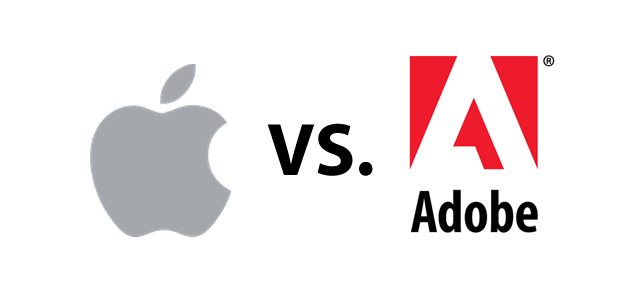Steve Jobs — the guy who famously flew a pirate flag over the building where the Macintosh was being invented, thus rescuing Apple from oblivion — is at it again. This time the fight is with Adobe, makers of the Flash platform that is currently the dominant software for playing interactive and video Web content.
Some truths about Steve Jobs are undeniable. He’s obviously brilliant, an iconoclast, and supremely successful. He’s so successful that Apple recently passed Microsoft in terms of market value. That’s right, Apple, the company Jobs rescued several times, keepers of “cool,” has passed stodgy Microsoft. Sure, Microsoft owns more than 90 percent of the desktop computer operating systems market with Windows, and an estimated 80 percent of enterprises use some form of Microsoft Office. But the market is betting that “cool” is more valuable than “foundational.” It’s betting that Microsoft won’t be able to innovate fast enough, even as Apple has become synonymous with innovation.
So it’s no wonder that when Apple — meaning Jobs — refused to support Flash first on iPhones and then on iPads, the tech community paid notice. The guessing began. What’s Jobs up to? Will Apple launch a competitor to Flash? What’s Jobs really trying to achieve at the cost of ignoring such a dominant standard? Is it all about controlling the App Store?
In the past few weeks the fight became more public, with both Jobs and Adobe stating their cases. On April 29, Jobs released a statement saying that Apple wouldn’t support Flash because a) it’s not an open standard; b) Flash is unreliable, has security flaws, and lacks performance on mobile devices; c) when playing video on mobile devices like the iPhone and iPad it drains the battery too quickly; and d) it didn’t originally support touch screens, though it now does. Finally, Job’s stated “the most important reason” — Apple insists on controlling the hardware and software platform all the way up to the developer. In other words, the developer must use the software tools and development libraries that Apple provides. Period.
Adobe’s official response came in the form of a statement from Adobe’s founders Chuck Geschke and John Warnock entitled, Our Thoughts on Open Markets. In it they said, “As the founders of Adobe, we believe open markets are in the best interest of developers, content owners, and consumers. Freedom of choice on the Web has unleashed an explosion of content and transformed how we work, learn, communicate, and, ultimately, express ourselves.” And, “No company — no matter how big or how creative — should dictate what you can create, how you create it, or what you can experience on the Web.”
It’s not a completely black and white situation of course, but I think that it’s pretty close. The first several reasons cited by Jobs are simply misdirection. For the most part, they don’t hold up under scrutiny. The real reason is the one that Jobs called the most important: control. And while Flash isn’t a completely open standard, my company, Flypaper, exists because it’s close enough. So the real battle here IS really “open” vs. “closed.” And I’m surprised that Jobs has taken the position he has. I’m old enough to remember a time when Jobs was at a similar fork in the road and made a similar choice — and nearly lost his company as a result. Most people don’t remember that the Mac, with its graphical user interface, preceded Windows into the marketplace. For some time it had a larger market share than Windows. But Apple chose to pursue a closed, proprietary strategy that limited the number of software titles available for the Mac. In contrast, Microsoft chose an open approach; software titles proliferated, and soon Microsoft’s market share was in the 90 percent range. Microsoft came to dominate the corporate space, while Apple’s market share hovered around 10 percent, much of it in the educational space. In the marketplace, “open” dominated “closed,” and Apple suffered through nearly a decade of tough times as a result.
It’s a situation rich with irony. Decades ago Apple and Microsoft faced off on this very issue and Microsoft won. Now Apple, having finally passed Microsoft in terms of value and faced with the same choice, is making the same decision. Will it work this time? I don’t think so. But the winner this time won’t be Microsoft. It won’t even be Adobe. At least not directly. The real winner will be Google. Google is the new champion of “open”’ And most people don’t know that sales for mobile devices based on Google’s open Android operating system recently passed sales of Apple’s iPhone. Right now Apple’s market value of about $227 billion is about $70 billion more than Google’s. As always, the market will ultimately decide who’s right. I’m betting on Google.




